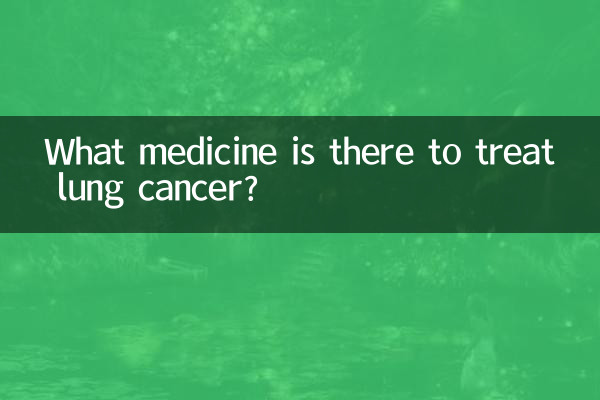What medicine is there to treat lung cancer?
Lung cancer is one of the malignant tumors with the highest morbidity and mortality worldwide. As medical research continues to deepen, drugs for the treatment of lung cancer are also constantly updated. This article will give you a detailed introduction to the current main drugs for the treatment of lung cancer based on recent hot topics and hot content across the Internet, and present relevant information in structured data.
1. Classification of Lung Cancer Treatment Drugs

The treatment drugs for lung cancer are mainly divided into the following categories:
| drug type | Representative medicine | Applicable people | Mechanism of action |
|---|---|---|---|
| chemotherapy drugs | Cisplatin, carboplatin, pemetrexed | Extensive-stage small cell lung cancer and non-small cell lung cancer | Suppresses tumor growth by destroying cancer cell DNA |
| Targeted drugs | Gefitinib, osimertinib, crizotinib | Non-small cell lung cancer patients with EGFR, ALK and other gene mutations | Precisely target specific genetic mutations to attack cancer cells |
| immunotherapy drugs | Pembrolizumab, nivolumab | Lung cancer patients with high PD-L1 expression or microsatellite instability | Activate the immune system to attack cancer cells |
| anti-angiogenic drugs | Bevacizumab, ramucirumab | Patients with advanced non-small cell lung cancer | Inhibit tumor angiogenesis and cut off nutrient supply |
2. Recent popular lung cancer treatment drugs
According to the hot content on the Internet in the past 10 days, the following drugs have attracted much attention:
| Drug name | R&D progress | clinical effect |
|---|---|---|
| Osimertinib (Tagrisso) | Approved for postoperative adjuvant treatment of early-stage EGFR mutated lung cancer | Significantly reduces the risk of recurrence |
| Atezolizumab (Tecentriq) | Combination chemotherapy becomes a new first-line treatment option for small cell lung cancer | Extend patient survival |
| Lorlatinib | Third-generation targeted drugs for ALK-positive lung cancer | Significant effect on patients with brain metastases |
3. Selection and precautions for lung cancer treatment drugs
1.individualized treatment: The treatment of lung cancer requires a personalized plan based on the patient’s genetic test results, pathological type and stage.
2.side effect management: The side effects of different drugs vary greatly. For example, targeted drugs may cause rashes and diarrhea, and immunotherapy may cause immune-related adverse reactions.
3.drug resistance issues: Long-term use of targeted drugs may lead to drug resistance, and regular review and adjustment of treatment plans are required.
4.clinical trial: For patients who are ineffective with standard treatments, they may consider participating in clinical trials of new drugs.
4. Future development trends of lung cancer treatment
1.bispecific antibodies: Drugs targeting two sites simultaneously are under development.
2.ADC drugs: Antibody-drug conjugates (such as Enhertu) show potential in HER2-mutated lung cancer.
3.personalized vaccines: Therapeutic vaccines based on tumor neoantigens have entered the clinical trial stage.
4.AI-assisted treatment: Artificial intelligence technology helps precise medication for lung cancer.
Conclusion
The field of lung cancer drug treatment is changing with each passing day. Patients should maintain confidence and actively cooperate with doctors to develop the most suitable treatment plan. The drug information provided in this article is for reference only. Please follow your doctor's advice for specific medication.
Note: The data in this article comes from recent public medical information, as of October 2023. Treatment options may change as research progresses, please refer to the latest clinical guidelines.

check the details

check the details